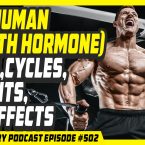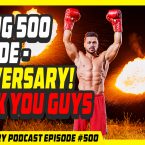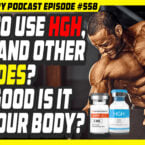Sign up to Get FREE Steroids, SARMS, Peptides eBooks
Human growth hormone has been growing in popularity among many different types of people including pro athletes, bodybuilders, and the elderly due to its miraculous ability to build muscle and fight aging. However, a controversial new University of Stanford study claims that the drug doesn’t enhance strength and instead causes muscle fatigue. It can even cause athletes to get injured!
Ever since the turn of the millennium, human growth hormone has been hailed by some as the do-it-all wonder substance that can help out everyone in some way. It is supposed to pack on major muscle for bodybuilders, help enhance the athletic ability of sports competitors, and even slow down the aging process for older people looking for a proverbial fountain of youth.
Human growth hormone has become such a hot item that many celebrities, bodybuilders, trainers, and professional athletes have risked their careers by using or distributing HGH to others.
Just look at all the criticism Sylvester Stallone faced after being detained at an Australian airport when he was caught with 48 vials of Jintropin. Or notice how Roger Clemens is practically going through hell now in his congressional trial after being ratted out by a former teammate for using HGH.
And do you want to know what the most gut-wrenching thing of all is for Clemens, Stallone, and all the other people that have been crucified for using the substance banned in many parts of the world? It may not even work!
This is according to a University of Stanford study that sought to find out if human growth hormone truly packs on muscle and builds a better athlete or if the size gains made through the usage of the substance are merely for show rather than effectiveness.
Stanford definitely tried to go all out in conducting their research as they did 27 different studies on a total of 303 people to test how real HGH worked on one group versus another group who was giving a placebo drug. And the results they found goes against what a lot of the conventional wisdom is out there today.
Now the first thing that the Standford group discovered wasn’t all that earth-shattering as they were able to determine from their research that human growth hormone does help people gain more lean body mass. 4.6 pounds worth of lean body mass to be exact (over about 80 days) and this average came from the people in the study who ranged from age 13 to 45.
Bodybuilders and other athletes have known for quite some time that HGH has a positive effect on gaining size and mass. But what the majority of them didn’t know comes from the other findings of the Stanford study. And that is, while those tested did gain lean mass, the strength of their muscles didn’t seem to improve at all.
This begs the question of how human growth hormone could increase lean body mass but not increase strength in individuals. For an answer to this the lead researcher in the study, Hau Lui, had an explanation. He claimed that the methods used in the study didn’t provide any means for differentiating lean mass versus fluid mass but he suspects that the size gained in the muscles was mostly fluid retention rather than muscular growth.
Perhaps even more amazing than this finding was that the study concluded the use of human growth hormone could actually hinder the performance of muscles. For evidence of this, the researchers explained that many participants in the study were experiencing hormone-related problems while working out.
Many of the people in the study generated more lactate acid in their muscles than normal while working out. This increased muscle fatigue in the subjects and got so bad in a couple people that it forced them to quit their cycling workouts.
Lui commented on this by saying, “In growth hormone-treated groups, people think they\'ll get an energy boost, but we found higher rates of fatigue.” He went on to mention, “What we found suggested that it didn\'t help and at some point, it might hurt.”
They did find some good in the usage of HGH though and this came mainly with older people. The elderly and/or sick people that used the HGH and were deficient in human growth hormone experienced positive reactions to the treatments. But this was about the only thing that the study claimed was good as far as HGH usage goes. And the team stuck with their original assessment that healthy and younger people don’t need to use the substance.
So there you have it – bodybuilders, athletes, and everyone else needs to stop using human growth hormone because it doesn’t work and may even get us hurt in the process... right? Well not exactly as this study isn’t the most exacting one ever conducted.
For starters, the doses that the study’s subjects were taking are far less than those typically taken by a bodybuilder or professional athlete. To tell the truth, a pro athlete might take up to five times more than what the people in the study were doing.
Even Lui conceded, “We\'re trying to paint a broad picture of outcomes. If we ultimately want to answer questions about whether growth hormone or combinations of drugs help baseball players hit that home run, then we need to do more studies that closely mimic what athletes are doing.”
And speaking of the combinations, that was another thing Lui and the rest of the Stanford team failed to address. When many people use HGH to build muscle or enhance athletic performance, they use it in combination with steroids and other drugs. This study overlooked the combination element and instead focused on just human growth hormone usage.
The last big-time flaw of this study lies in the fact that one of HGH’s major uses in injury recovery was largely ignored. This reason for use is highly prevalent among athletes looking for a quicker way to get back into action. And the Stanford team didn’t really examine how HGH affects injury recovery.
So obviously these researchers still have a long way to go before they can actually prove that human growth hormone won’t help pack on major muscle or enhance athletic performance. And despite doing 27 different studies on 303 people, they are left with more questions to answer in the end.
Just with the three things mentioned in this article, there will be many more studies to conduct to prove that human growth hormone is pretty much ineffective as far as gaining size and developing strength goes. And until these studies are actually done, I’ll have a hard time believing that HGH will ever have a tremendously negative effect on an athlete’s performance.
[sc:signoff-std]  | Do you want massive shoulders, huge pecs and ripped abs, reeking of power and sexual magnetism? For most frustrated guys, it\'s impossible, but for a few, it\'s easy if you understand exactly what to do...Finally, one single guide tells you the bottom line on everything: training, diet, supplements, and steroids! And it shows you how to put it all together to quickly and safely build the thick, dense muscle mass that women love and shred off your extra fat!But don\'t be a casualty of misinformation! Do not fall victim to the Bodybuilding Scammers (the Magazine Publishers, Supplement Makers, and Web Sites) who\'ll take your money and keep you from getting buff!Learn how to detect their lies and money wasting scams and learn the bottom line toward more ripped muscle -- right away!Read on... And start growing... |







